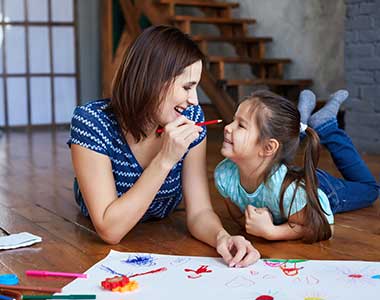Shyness in Children

Do you feel that your child is shy around people? Does he become anxious when meeting other people?
A shy child is
- Anxious or inhibited in unfamiliar situations or when interacting with others, such as when meeting someone new or having to speak in front of others. He finds it difficult to assert himself in a group and is more comfortable to watch the action from the sidelines rather than join in. The feeling of being different is at the core of the shy child's distress.
At what age can I know if my child is shy?
We can talk about shyness in children around ages 4-5, not before that age.
It is good to know that a shy child with a healthy self- worth makes eye-to-eye contact, is polite, and seems happy with herself. She is just quiet. Her behaviour is generally good; she is a nice child to be around, and people are comfortable in her presence.
Shyness has positive aspects
Shy behaviour is associated with a number of positive behaviours including:
- Doing well at school
- Behaving and not getting into trouble
- Listening attentively to others
- Being easy to look after.
Shyness can become a problem when it reduces the child’s opportunities to develop or practice social skills; it can lead to fewer friends, which makes the child feel lonely and have low self-esteem; it reduces his participation in fun and rewarding activities such as sports, dance, drama or music and it increases anxiety levels. Parents can help their children overcome their shyness and make the best of it. Rarely, in severe cases, only professional help may be advisable.
Possible causes of shyness
Some of the possible causes of shyness, often working in combination, may include: Genetics and the child’s Personality traits (too sensitive, easily intimidated). But most common reasons are: Learned behaviour - children learn by imitating their most influential role models: their parents. Family relationships - children who don't feel very attached to their parents or who have experienced inconsistent caregiving, may be anxious and prone to shy behaviour. Over-protective parents may teach their children to be inhibited and afraid, especially of new situations. Children who have been pushed too many times beyond their capabilities (and then made to feel bad when they didn't 'measure up') may have a fear of failure that presents itself as shyness.
The combination of an extroverted, domineering mother and a more reserved child can also be a set-up for shyness. Not to forget that Lack of social interaction- children who have been isolated from others for the first few years of their lives may not have the social skills that enable easy interaction with unfamiliar people. Harsh criticism - children who are teased or bullied by significant people in their lives (parents, siblings and other close family members or friends) may tend towards shyness.
Your attitude is crucial- What you can do to help your shy child:
Parents are very influential in their children's lives - probably much more than parents realize. Suggestions include:
- Be careful not to label your child as 'shy'. Children (and adults) tend to live up to the labels others give them.
- Don't let other people label your child as shy either.
- Never criticize or mock your child when they are shy. Be supportive, empathetic and understanding.
- Encourage your child to talk about the reasons for their shyness - what are they afraid of?
- Tell your child about times in your life when you have been shy and how you overcame it. Since young children often see their parents as perfect, admitting to your own shyness can make your child feel better and reduce their overall anxiety.
- Be outgoing yourself. Model confident behaviour and lead by example.
- Tell your child about the many advantages of not being shy. Offer examples from your own life.
- Encourage outgoing behaviour. Praise your child when they handle an unfamiliar situation or meet a new person without resorting to shyness.
- Try goal-setting with your child. Aim for small, incremental steps and praise them for their progress. For example, saying 'hello' to another child may be a big first step.
- Deliberately take your child into new situations. Aim for small changes in behaviours first and gradually build up. For example, reward a child if they greet someone who is new to them. Be supportive.
- Make sure your child is allowed to excel in what they do best. Praise them for skills they have mastered
- Teach positive self-talk. Positive self-talk is saying positive things about one's self to one's self. With regard to shy children, parents can teach them to use positive self-talk aimed at convincing children that they are not shy. For example, when a shy child gets up the courage to ask a friend over to play, he or she can say to himself something like, "I'm not shy. I can talk to people and make friends."
- Teach tolerance and respect for others. Shy people are notoriously judgmental--both of themselves and others. The more judgmental you are as a parent, the more opportunity your children will have to learn to internalize those judgments even though you may have intended to direct them at someone else. They learn that going out in public means you will be continuously judged. In time, their world can become an unsafe place.
- In conclusion as the parent, it is very important to consider and remember that shyness is a personality trait and not a flaw. In some cultures, it is much appreciated. Teach your child to be proud of his shyness and to use it in an effective manner.
In conclusion, as a parent, it is very important to consider and remember that shyness is a personality trait and not a flaw. In some cultures, it is much appreciated. Teach your child to be proud of his shyness and to use it in an effective manner.













 Parenting Articles
Parenting Articles

